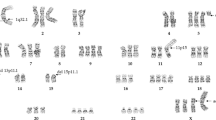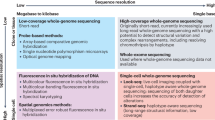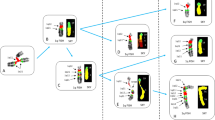Abstract
CHROMOSOME banding techniques1–4 have made possible not only the detection but also a more accurate characterisation of the structural chromosomal changes encountered in clinical and experimental work. Using internationally agreed band patterns and nomenclature5, it is customary to assign breakpoints to aberrations such as translocations on the assumption that these ‘breakpoints’ correspond to the positions of breakage and rejoining which gave rise to the configuration observed. This assumption is frequently invalid, because it does not seem to be generally realised that the system carries (at least for chromosome-type exchanges) an inherent three-band uncertainty. This means that the most obvious breakpoint is not necessarily the site of transfer or rearrangement of the genetic material.
This is a preview of subscription content, access via your institution
Access options
Subscribe to this journal
Receive 51 print issues and online access
$199.00 per year
only $3.90 per issue
Buy this article
- Purchase on Springer Link
- Instant access to full article PDF
Prices may be subject to local taxes which are calculated during checkout
Similar content being viewed by others
References
Caspersson, T., Lomakka, G & Zech, L. Hereditas 67, 89 (1971).
Sumner, A. T., Evans, H. J. & Buckland, R. A. Nature new Biol. 232, 31 (1971).
Seabright, M. Lancet ii, 971 (1971).
Schnedl, W. in Chromosome Identification (eds Caspersson, T. & Zech, L. 34 (Academic, New York, 1973).
Paris Conference (1971). Standardization in human cytogenetics. Birth Dejects: original article series 8, 7 (National Foundation March of Dimes, 1972).
Dutrillaux, B. & Leujeune, J. C.R. hebd. Séanc. Acad Sci., Paris 272, 2638 (1971).
Dutrillaux, B., Cauterier, J., VIegas-Péquignot, E. & Schaison, G. Hum. Genet. 37, 65 (1977).
Seabright, M. Chromosoma 40, 333 (1973).
Bigger, T. R. L., Savage, J. R. K. & Watson, G. E. Chromosoma 39, 297 (1972).
Holmberg, M. & Jonasson, J. Hereditas 74, 57 (1973).
San Roman C. & Bobrow, M. Mutat. Res. 18, 325 (1973).
Savage, J. R. K., Watson, G. E. & Bigger, T. R. L. in Chromosomes Today 4 (eds Wahrman, J. & Lewis, K. R.) 267 (Wiley, New York, 1973).
Savage, J. R. K. J. med. Genet. 14 (in the press).
Savage, J. R. K., Bigger, T. R. L. & Watson, G. E. in Chromosomes Today 5 (eds Pearson, P. L. & Lewis, K. R.) 281 (Wiley New York, 1973).
Buckton, K. E. Int. J. Radiat. Biol. 29, 475 (1976).
Ohnuki, Y. Chromosoma 25, 402 (1968).
Iino, A. Cytogenetics 10, 286 (1971).
Kato, H. & Yosida, T. H. Chromosoma 36, 272, (1972).
Bigger, T. R. L. & Savage, J. R. K. Cytogenet. Cell Genet. 15, 112, (1975).
Takayama, S. Chromosoma 56, 47, (1976).
Author information
Authors and Affiliations
Rights and permissions
About this article
Cite this article
SAVAGE, J. Assignment of aberration breakpoints in banded chromosomes. Nature 270, 513–514 (1977). https://doi.org/10.1038/270513a0
Received:
Accepted:
Issue Date:
DOI: https://doi.org/10.1038/270513a0
This article is cited by
-
Directional genomic hybridization for chromosomal inversion discovery and detection
Chromosome Research (2013)
-
Analysis of DNA replication during S-phase by means of dynamic chromosome banding at high resolution
Chromosoma (1990)
-
Distribution of radiation induced lesions in human chromosomes and dose-effect relation analysed with G-banding
Radiation and Environmental Biophysics (1979)
Comments
By submitting a comment you agree to abide by our Terms and Community Guidelines. If you find something abusive or that does not comply with our terms or guidelines please flag it as inappropriate.



